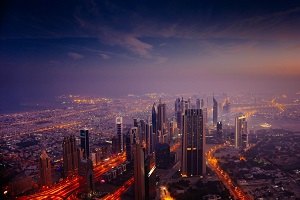Harnessing the power of smart cities for a brighter future

Recent innovations in 5G, Internet of Things (IoT) and fibre infrastructure technologies are helping to expand and fortify the networks of the future.
Smart cities around Europe which utilise these networks and the power of big data are now reaping the rewards of these innovations through the efficient management of city assets, resources and services, says Chris Barlow, innovation director at the Data Communications Company (DCC).
But to make these smart cities sustainable for the future, the connectivity infrastructure needs to be underpinned by highly efficient energy networks. Smart cities need to improve energy efficiency, not just to save money, but also to help their regions reach their respective net-zero carbon emissions targets.
With some parties becoming sceptical of increased technological adoption in city planning, smart cities must quickly demonstrate their value, by reducing energy costs and bringing about tangible change to everyday life. This will help drive community engagement, while also improving the green credentials of these regions for years to come.
The wide scope of connected devices
Across Europe, connected devices are already allowing for rich, interoperable services that benefit people today. Think of the modern smart meter, for example. It might not be the first thing that comes to mind when you consider smart city innovations; but, in Britain, smart meters are now commonplace, with nearly 10 million devices already online in homes and small businesses, connected to a single, nationwide and highly-secure network.
In mainland Europe, Barcelona has a proud history of incorporating smart sensors and big data analytics into everything from parking and transportation, to refuse collection and improving air quality. Or indeed in Copenhagen, where its traffic monitoring project monitors cycling traffic to enhance routes in real-time. None of this would be possible without a network of connected devices, constantly in contact with one another, harnessing big data to optimise energy usage at every turn.

Chris Barlow
But smart meters can be used for much more than measuring energy consumption; they can offer a gateway to greater smart city applications. For example, smart metering infrastructure can help future-proof the functionality of electric vehicle (EV) charging points, as demand for greener transport substantially increases.
The proliferation of smart EV charging will allow the energy sector to monitor and manage EV energy supply, helping provide an efficient flow of energy across municipal power grids. But for the next phase of this transport revolution to begin and for these benefits to be achieved, the current fractured approach to EV charging needs to be brought together under a standardised network.
By connecting to the grid through one unified system, we can increase our supply of renewable energy and bring further stability to our supply through secure load control.
The demand for greater efficiency
The next step for the smart city ecosystem is taking its energy efficiency processes even further. When every facet of a smart city communicates to optimise energy usage, and leverages renewables as much as possible, suddenly we see huge savings in energy consumption.
As energy is brought into the digital age, ensuring data anonymity and security will be crucial for the continued success of smart cities. A commitment to this needs to be enshrined in government policy and meet the highest security standards. Secure data will bring about a more sustainable system that can be trusted to advance environmental conservation initiatives.
If the widespread growth of smart cities is to continue, delivering dramatic improvements in the energy consumption of densely populated urban environments, such improvements will depend upon a singular, smart energy network underpinning it.
A bright future
We will see further expansion in the volume and scope of connected smart cities as the Covid-19 pandemic continues to reshape our relationships with our cities. Across the globe, we are seeing citizens who originally relocated to crowded metropolises for work demand more hospitable and caring living environments, as the pandemic removes (or reduces the frequency of) their daily commute.
From traffic calming to predictive lighting, connected devices will increasingly be called upon to improve day-to-day city life over the coming years. In Britain, the DCC’s secure data and communications network provides just one example of how these devices can enhance energy usage, to the benefit of consumers and businesses alike.
We believe that we are at a pivotal moment in the future of global energy infrastructure. The decisions we make now will lay the foundations for societies over the next 30 years. Soon, we will realise our ambitions of hyper-efficient, connected smart cities that open up a wealth of opportunities for everyone. We look forward to this bright future, empowered by technology.
The author is Chris Barlow, innovation director at the Data Communications Company (DCC).
Comment on this article below or via Twitter @IoTGN
